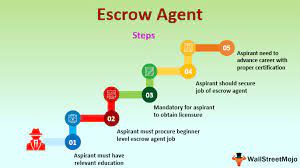Throughout the home-buying process, a trusted and neutral third party may be required to handle money while you complete certain transactions. Perhaps you need an escrow agent. However, this article contains details about the escrow agent, its definition, fee, agreement, and who the escrow agent works for. Furthermore, you will discover more about software escrow agreement, holding funds, source codes, and samples, all you need to know.
Escrow Agent
In financial transactions, particularly those involving real estate, an escrow agent safeguards money. However, he also protects property and enforces escrow agreements. An escrow agent owes a fiduciary duty to both parties to the transaction and is only permitted to act in accordance with the agreement’s terms.
The escrow agent is involved in the real estate transaction from the time a seller accepts an offer to the time of closing.
After you and the seller sign a purchase agreement, you pay an earnest money deposit. This is to demonstrate your seriousness about purchasing a property, such as a home. However, the agent verifies that the payment is accurate and then deposits it. He puts this, along with the title and other paperwork, in an escrow account. Perhaps, the agent or escrow company will hold until both parties fulfill their contractual obligations under the sale.
Read Also: Real Estate Investment
Who Does The Escrow Agent Work For?
The buyer and seller will enlist the assistance of a third party. Throughout the closing process, Escrow has a fiduciary responsibility to both the buyer and seller.
In general, Escrow is a term that refers to money that is held by a third party. This is usually on behalf of the parties involved in a transaction. It is frequently used in connection with the acquisition of a company’s stock. However, it is most well-known in the United States as a term used in reference to the real estate industry. Specifically in mortgages where the mortgage company establishes an escrow account to pay property tax. It also includes insurance during the term of the mortgage).
You May Also Read: REAL ESTATE LAWYER: How to become a real estate lawyer guide( +Quick Tips)
Meanwhile, let’s see it from another angle, Escrow is a separate account from the mortgage account. The account involves funds deposited for the payment of certain mortgage conditions, typically property taxes and insurance.
On the other hand, the escrow agent is responsible for properly accounting for escrow funds. You can ensure that funds are used for the express purpose intended via escrow. Nonetheless, due to the lender’s unwillingness to take the risk of default on property taxes.
Basically, Escrow companies are also frequently used in the transfer of high-value personal and business property. These include websites and businesses, and in the completion of person-to-person remote auctions (such as those on eBay). Although the advent of new low-cost online escrow services means that even low-cost transactions are now benefiting from the use of escrow.
What is Escrow Agent?
An escrow agent is a person or entity that holds property in trust for third parties during the course of completing a transaction or resolving a disagreement. Often, an attorney fills the role of escrow agent (or notary in civil law jurisdictions). The escrow agent owes a fiduciary duty to the escrow agreement’s parties.
In the context of an escrow agreement, an escrow agent essentially acts as a neutral middleman. Meanwhile, the funds or assets remain with the Escrow agent until predetermined contractual obligations are met.
This May Interest You to Read: REAL ESTATE DEVELOPMENT BUSINESS: How to become a Developer and detailed steps to start a company
Escrow Agent Fee
So, you’ve decided to sell your home and have retained the services of an excellent real estate agent. What else do you need to do on your end? You must negotiate the escrow agent fee and closing costs. However, what are the costs of escrow, and what types of fees can you anticipate for the escrow portion of your transaction?
Escrow Agent Fee Calculation
By and large, an Escrow agent will generate a buyer and seller-based escrow fee based on the purchase price. I made a few phone calls to local businesses in San Diego and my preliminary research indicates the following range:
- Prices range from $1.00 to $2.25 per $1,000 in value, plus a $250–500 base fee.
- Calculation Example: Purchase Price $450,000
However, for this example, the base Escrow fee will be $375. (average), plus a $1.50 per thousand fee = 450 x $1.50 = $675. Meanwhile, for a purchase price of $450,000, the seller’s average escrow fee would be $1,050.
You need to understand that a similar fee would be assessed on the buyer’s side of the escrow. Therefore, there are several critical points to remember when shopping for services. Typical add-ons include wire transfers, courier services, overnight delivery, and miscellaneous storage charges.
Escrow Agreement
An escrow agreement is a contract that details the terms and conditions that apply to the parties involved, as well as their respective responsibilities. In other words, the agreement involves also an independent third-party escrow agent, who holds a valuable asset until the contract’s specified conditions are met. They should, however, clearly define the conditions for all parties involved.
Software Escrow Agreement
It is a frequent misunderstanding that a software escrow agreement is simply physical storage. Or perhaps a transfer of escrow materials to a licensee in the event of a release condition. While storage is a critical function of the escrow, there is another function that is equally as critical to the licensee. However, a properly structured escrow will provide the legal framework necessary to ensure the material’s release and subsequent use by the licensee.
Additionally, each software project is unique, necessitating the use of customized agreements. Ascertain that your escrow provider has the expertise necessary to collaborate with your attorney to structure a software escrow agreement that meets any unique requirements that may arise.
Read Also: Real Estate Business Cards: Best Ideas, Templates, Samples & Quotes to Close deals Faster
Types of Software Escrow Agreement:
#1. SINGLE BENEFICIARY (LICENSEE)
The Single Beneficiary “SB” agreement is a three-party transaction involving a software vendor (owner), a single beneficiary (licensee), and EscrowTech. You can use this type of agreement in the following situations:
- There is only one vendor for the software.
- If the license is just an individual
#2. MULTIPLE BENEFICIARY-SEPARATED PRODUCTS
Multiple Beneficiaries – Distinct Products A “MB-SP” agreement is a multi-party contract between a software vendor (owner), EscrowTech, and an unlimited number of additional beneficiaries (licensees) for multiple software products. You can use this type of agreement in the following situations:
- There is only one vendor of the software.
- There will be at least one beneficiary.
- The escrow materials contain information about various software projects.
- Not all beneficiaries should be able to participate in all software development projects.
Read Also: Probate Sale: Best Real Estates Practices And All You Need.
#3. MULTIPLE BENEFICIARY-SEPARATED ESCROWS
The Multiple Beneficiary – Separated Escrows “MB-SE” agreement is a multi-party contract between a software vendor (owner), EscrowTech, and an unlimited number of additional beneficiaries (licensees) who have their own customized deposit materials. You can use this type of agreement in the following situations:
- There is only one vendor for the software.
- There will be at least one beneficiary (licensees)
- However, each beneficiary’s deposit materials are unique and should be stored separately.
#4. CUSTOM AGREEMENTS
Each software project is unique, which frequently results in unique and difficult situations. However, EscrowTech understands these circumstances and has been tailoring its agreements to address the issue for over 24 years.
Meanwhile, EscrowTech’s General Counsel can collaborate with you and your attorney to tailor an agreement to your specific circumstances.
Escrow Agreement To Hold Funds
An escrow agreement to hold funds is a contract that details the terms and conditions of a transaction involving something of value, that is held by a third party until all conditions are met. However, the agreement’s terms and conditions will have been agreed upon by the transacting parties prior to escrow.
In general terms, the independent third party, referred to as an escrow agent, is responsible for document storage. Also, oversight of the transaction’s required funds payment.
Read More: Door Knocking: Best 2023 Real Estate Practices (+ Free Script Strategies)
Escrow Agreement Source Code
The source code and its third-party dependencies are the foundation of a software escrow. It includes the following below.
#1. Internal repositories
While this may seem self-evident, every now and then, during a technical verification, we discover that the majority, but not all, internal repositories have been escrowed. A technical verification can ensure that all necessary repositories are present.
#2. Third-party dependencies
The majority of software is developed using frameworks, libraries, or other third-party dependencies, which can be difficult to locate years after the source code is released from escrow. To facilitate the licensee’s use of the software, the vendor should escrow not only third-party dependencies but also license keys.
This May Interest You: Diversifying Portfolios: Meaning, Pros, Cons & How-to Guide
Escrow Agreement Sample
Homebuyers frequently see themselves twice as they close escrow. To begin, suppose John is in the market for a home. John locates a property and makes an offer. The offer is accepted, and he is required to place an earnest money deposit, say $5,000, in escrow. The money placed in escrow indicates to the seller that you are serious about potentially purchasing the property, and in exchange, the seller will remove the property from the market and complete any necessary repairs. Perhaps, if everything goes according to plan, and at the time of purchase, the seller receives the escrow funds and the purchase price is reduced by $5,000.
Read Also: AMERICAN RESIDENTIAL WARRANTY: Best Easy Guide for Newbies
The buyer agrees at the closing to establish an escrow account with the lender for the purpose of paying property taxes and homeowners insurance. Thus, John’s monthly payments look as follows:
- One thousand dollars for principal and interest
- Insurance for homeowners is $100.
- $300 for real estate taxes
- Monthly mortgage payment totaling $1,400
However, the lender will then pay the yearly taxes and insurance from the escrow account.
Who Cannot Be an Escrow Agent?
Escrow agents often need to have the appropriate licenses in order to operate their businesses. The escrow agent additionally needs to be a separate party from the transaction. For instance, the escrow account cannot be held by either the seller’s lawyer or the buyer’s real estate agent.
Who Appoints the Escrow Agent?
On behalf of all Sellers, Buyer and Sellers’ Representative appoint the Escrow Agent to operate as escrow agent, and the Escrow Agent consents to do so under the terms and circumstances of this Escrow Agreement.
What Does Escrow Stand For?
Escrow is a legal term that refers to a financial arrangement in which a third party holds an asset or money on behalf of two other parties who are carrying out a transaction. The escrow agent is in charge of escrow accounts.
What Should You Not Do During Escrow?
- Avoid making major purchases that might be considered debt.
- Do not apply for or start any new credit lines.
- Avoid making financial changes, such as switching to a new employment or bank.
What Is Salary of Escrow Officer in California?
In California, an escrow officer makes an average yearly pay of $91,000. In California, compensation for escrow officers can range from $38,500 to $293,000 and is influenced by a number of variables, including experience, employer, bonuses, and tips.
Who Can Be an Escrow Agent in California?
Escrow agents frequently need to be duly licensed in order to operate their businesses. Furthermore, the escrow agent cannot be a party to the transaction in any other way. The escrow account cannot, for instance, be held by either the seller’s lawyer or the buyer’s real estate agent.
Who Holds Money in Escrow?
Your lender will set up an escrow account to pay for your taxes and insurance when you buy a house. After closing, your mortgage servicer deducts a portion of each monthly payment and places it in an escrow account until the time comes for you to make your tax and insurance payments.
Conclusion
Escrow can be used for a variety of purposes, including real estate transactions, stock issuances, and online sales. Generally, the company managing the escrow account charges for the third-party service. You can refer to the charges as escrow agent fees.
Related Articles
- Escrow on a Mortgage: Understanding the Escrow Process & Requirements(Opens in a new browser tab)
- WHAT IS ESCROW SHORTAGE? Causes & How To Avoid It(Opens in a new browser tab)
- ESCROW SHORTAGE: What It Is And How To Fix It(Opens in a new browser tab)
- Mortgage: Simple 2023 Guide for Beginners and all you need Updated!!!(Opens in a new browser tab)
- What is Trust Accounting? Overview, and How it Works(Opens in a new browser tab)






